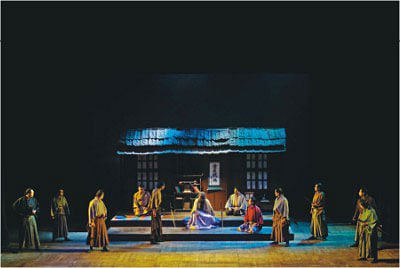One Hundred Sacks of Rice

The play is set against the backdrop of the transition
from Shogunate era to Meiji resurrection, about 140 years ago. Photo: STAR
“One Hundred Sacks of Rice”, a play produced jointly by Bangladesh Shilpakala Academy and the Japanese Embassy in Dhaka, was staged on March 15 at the National Theatre Hall of the academy. The staging was part of a celebration to mark the 40th anniversary of the diplomatic relationship between Bangladesh and Japan.
The Japanese Ambassador to Bangladesh, Shiro Sadoshima, and Director General of Shilpakala Academy, Liaquat Ali Lucky, attended the show.
The 16th Uchimura Naoya Prize (conferred by International Theatre Institute, Japan; 2008) winning play, “One Hundred Sacks of Rice”, has been directed by Golam Sarwar. An adaptation of a Japanese literary work by Yuzo Yamamoto, the play has been translated into Bangla by Professor Abdus Selim.
Director Golam Sarwar informed that the play has been selected for another prestigious Japanese award conferred by the Nagaoka Kome Happya Foundation. The authority will formally hand over the award this June.
The play is set against the backdrop of the transition from Shogunate era to Meiji resurrection, about 140 years ago.
During the Edo era, a war between Tokugawa Shogun and the Emperor, known as the Meiji Restoration War, took place. Nagaoka was an affluent region before the war. However, after the war started, Nagaoka faced a bad harvest and inevitable poverty. As aid, one hundred sacks of rice were sent to Nagaoka.
Many of the samurais and farmers, who survived the war, demanded the rice be shared among them. However, after a long debate, Torasaburo Kobayashi, one of the Nagaoka ministers and a highly educated samurai, persuaded his lord and the people to sell the rice instead of consuming it.
He argued that sharing the rice would mean consuming it within days, but if they sold the rice and with the money built a school to educate children, these 100 sacks of rice would function as investment.
The Bangladeshi actors did a commendable job in incorporating Japanese nuances, especially a samurai's gestures. Constant allegorical reference of the sword -- an inseparable companion of a samurai -- made the dialogues meaningful.
A group of known faces from different theatre troupes performed lead roles in the play. The cast included Junaid Eusuf, Md. Nur Zaman Raja, Md. Rafi, Abul Kalam Azad, Faiz Zahir, Golam Shahriar Rabbi, Tashmi Tamanna, Sharmin Sangita Khanam, and Md. Abdul Qaium Bhuiyan.
Faiz Zahir and Junaid Eusuf did the set design and Thandu Raihan was the light designer. Ahsan Reza Khan directed the music.

 For all latest news, follow The Daily Star's Google News channel.
For all latest news, follow The Daily Star's Google News channel. 



Comments